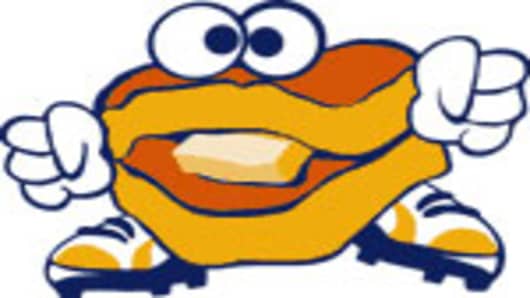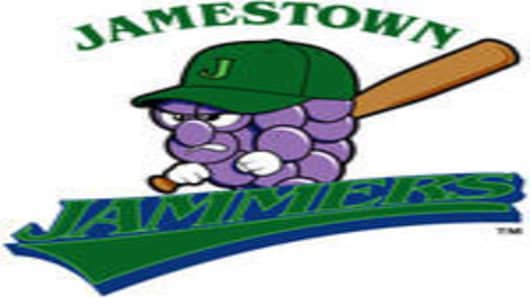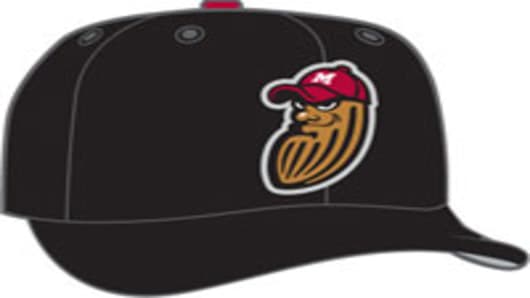First Annual CNBC Minor League Logo Awards:
Ever since I started collected minor league hats as a sixth grader - when you actually had to write the teams to buy a cap -- I've had an obsession with minor league logos. So I'd like to start a tradition here at CNBC -- the Minor League Logo Awards. It's all subjective here, so please write me at sportsbiz@cnbc.com if you think a certain team is either not on the list or is underrated or overrated.
Montgomery Biscuits -- I will never forget the first time I saw this logo last year. It's essentially a running Egg McMuffin with a piece of butter as a mouth. So ridiculous, it's brilliant.
Jamestown Jammers -- The Jammers wouldn't have had a chance
with their logo last year, but this year, they changed to a vine of grapes wielding a bat and I love it.
Modesto Nuts -- If you wear this out, there's no way people won't ask you what it is. For those scoring at home, it would be a nut with a hat on him on a hat.
Albuquerque Isotopes -- It's more simple than most of the ones that catch my eye, but the story behind the name of the team makes this a very popular buy. Fans of the Simpsons might think this team name is familiar. In one episode, Homer found out that the local Springfield Isotopes
were going to move to Albuquerque. So the team, long named the Dukes (actually the first minor league hat I ever got) was renamed the Isotopes.
My honorable mention teams are ...
and the Greensboro Grasshoppers
About Those Kenyan Runners:
My blog on Friday about Kenyan runnerswinning marathons because the $100,000 winner's prize meant more to them resulted in a flooding of my e-mail box. And the fact that Robert Cheruiyot won yesterday -- extending the Kenyans winning run in the Boston Marathon men's race to 15 out of the last 17 races -- didn't do anything to slow it down. I'll share with you two of the notes that I feel will keep this conversation going.
First, I'll share with you a note from reader Wilson Kiriungi: "I agree with you that Kenyans do generally care more than say Americans when it comes to the marathon but that alone does not conclusively explain their consistent success in the sport. Being a Kenyan, I know that not all Kenyans can run. Put it this way, the same way basketball is dominated by African Americans, only Kenyans from a small tribe called the Kalenjin make the best runners. They are not historically known to put a lot of stock in materialism in the modern sense of the word; cattle is their real measure of wealth. As a matter of fact, if money were the sole fuel that keeps the Kenyan athlete's engine running, we would expect to have more runners from the Kikuyu tribe who are known to be the most enterprising tribe in Kenya. The question of what makes Kenyans such good runners (in my case the Kalenjins) still puzzles me like a lot of other people. One thing I can certainly say is that if it was about the money, I wouldn't be sitting here writing this email. I would probably be somewhere in Boston sipping Margarita, reveling in my perennial 15 minutes of fame."
The second note from a reader named Steve, disputing my notion that the Kenyans were somehow built better than people in other areas of Africa: "Nigerians are just as poor as Kenyans, yet they don't win at distance racing, they win at the 100m and 200m instead. Runners of West African descent are terrible at distances above 1500m, just as Kenyans and Ethiopians aren't competitive at 100m and 200m. Sounds biological to me."






